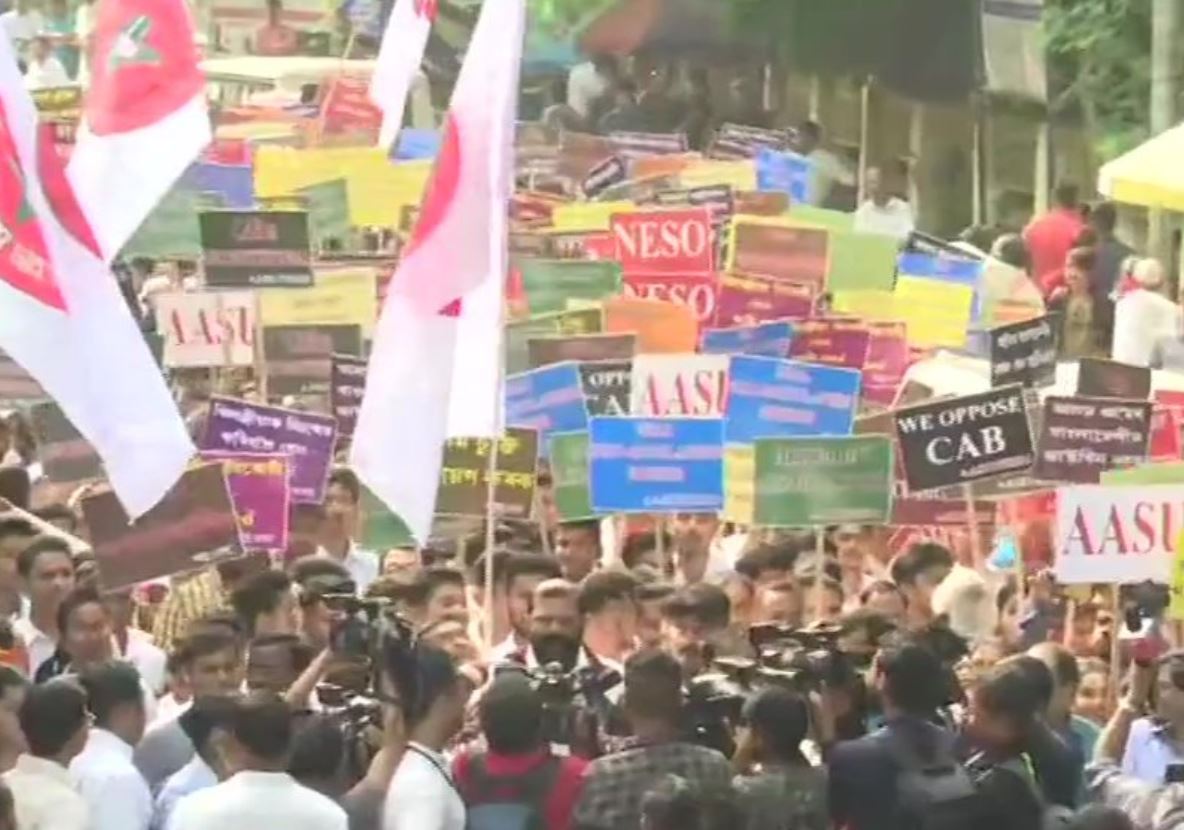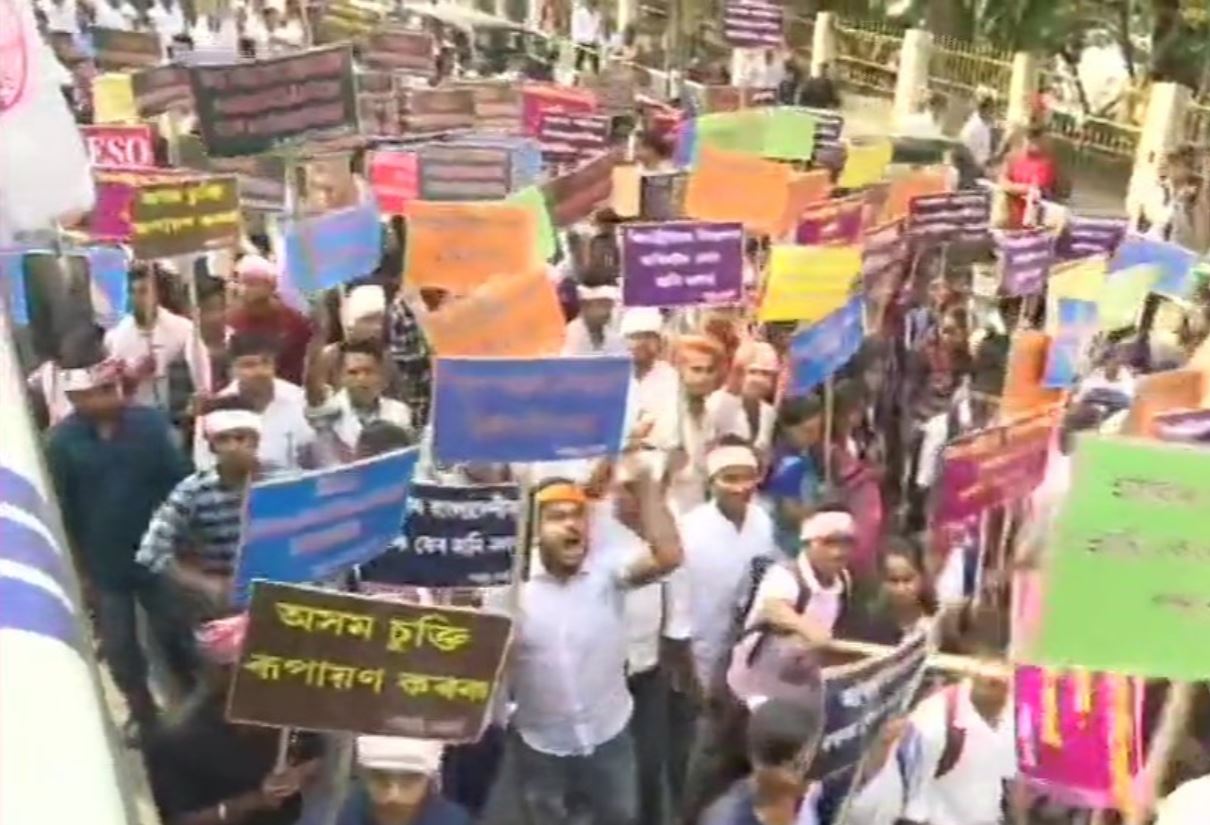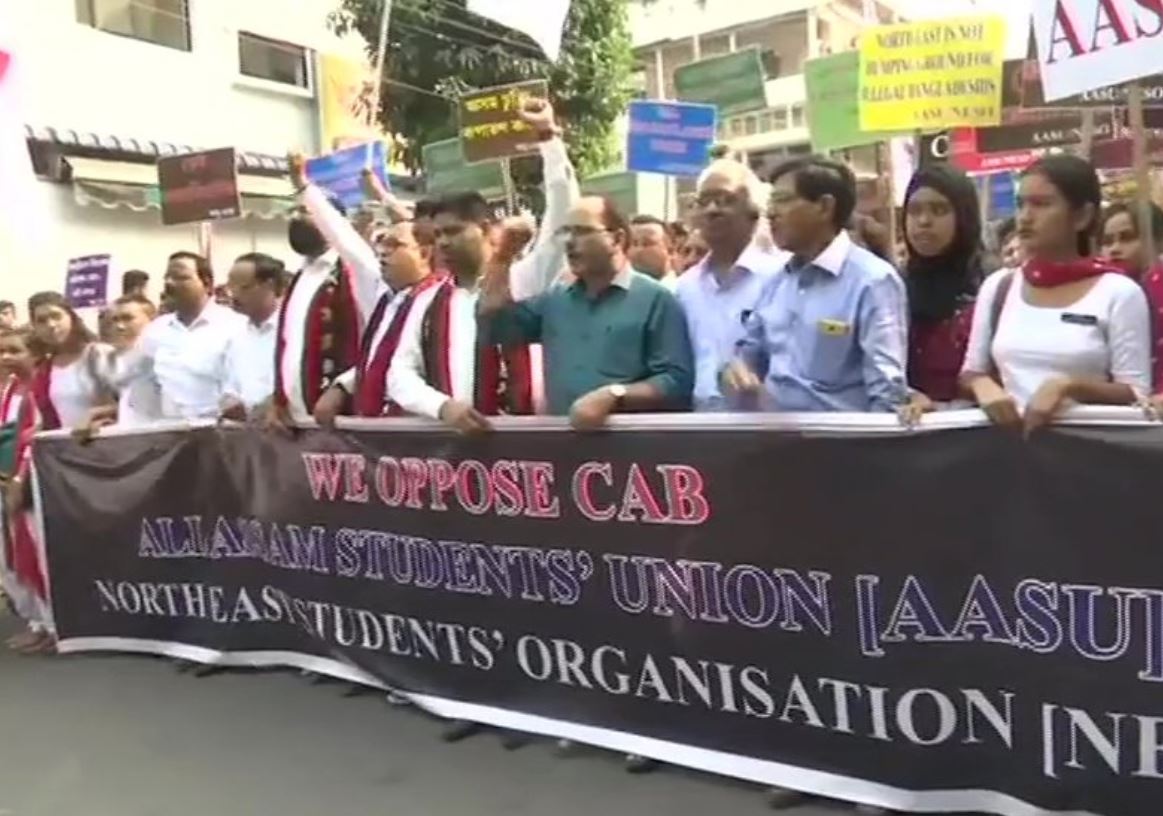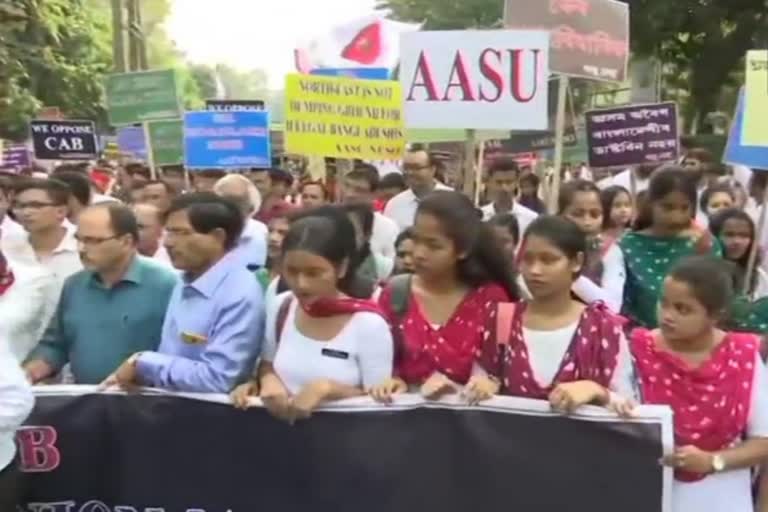આ બિલને સરકાર શિયાળું સત્રમાં રજૂ કરાવવાની તૈયારીમાં છે.ગુવાહાટીમાં અલગ-અલગ જગ્યાએ ધરણા કરવામાં આવ્યા છે. યુવા સંગઠન AJYCPએ રાજ્યના વિભન્ન સ્થાનો પર મુખ્યપ્રધાન સર્વાનંદ સોનોવાલના પુતળાનું પણ દહન કરવામાં આવ્યું છે.
આ પ્રદર્શન નોર્થ ઈસ્ટ સ્ટુડન્ટસ ઓર્ગેનાઈઝેશન (NEOS) અને કૃષક મુક્તિ સંગ્રામ સમિતિ, આસમ જાતીયતાવાદી યુવા વિર્દ્યાર્થી પરિષદ, (AJYSP) અને લેફ્ટ ડેમોક્રેટિક મંચ, અસમ સહિત અન્યએ આયોજિત કર્યું હતું. NEOSએ પૂર્વોતર રાજ્યના રાજ્યપાલ દ્વારા વડાપ્રધાન નરેન્દ્ર મોદી અને કેન્દ્રીય ગૃહ પ્રધાન અમિત શાહને નાગરિકતા સંશોધન બિલ વિરુદ્ધ માહિતી મોકલી છે.
NEOS અને AASUએ અન્યની સાથે મળી ગુવાહાટીના ઉજાન બજારમાં આવેલા કાર્યાલયથી રાજભવન સુધી રેલી કાઢી અને બિલ વિરુદ્ધ સુત્રોચ્ચાર કર્યા હતા. ભટ્ટાચાર્યએ કહ્યું કે, આ આંદોલન આસામ અને પૂર્વોતરમાં ચાલું રહેશે.
નાગરિકતા સંશોધન બીલ વિરુદ્ધ પૂર્વોતર ભારતમાં પ્રદર્શન બિલનો કાયદો બનાવવાથી અનેક સમસ્યાઓ હલ થવાની આસમના પ્રધાન હિંમત બિસ્વ સરમાએ કહ્યું હતું. અન્યના એક નિવેદન પર ભટ્ટાચાર્યએ કહ્યું કે, તે ભાજપના વોટ બેન્ક સુરક્ષિત રાખવા માંગે છે.તેમણે કહ્યું કે, અમે નાગરિકતા સંશોધન બિલનો સ્વીકાર કરશું નહી. માટે અમે બિલ વિરુદ્ધ આંદોલન શરુ કર્યુ છે.
AASUના અધ્યક્ષ દીપાંક નાથે કહ્યું કે, નાગરિકતા સંશોધન બિલ અસમ સમુદાયનો નાશ કરશે. અહિ બાંગ્લાદેશિયોને આસમમાં ઘૂસવા માટે દરવાજા ખોલશે. મેધાલયમાં અનેક વિદ્યાર્થી યૂનિયનના સચિવાલય પાસે વિવાદીત બિલ વિરુદ્ધ ધરણા કર્યા છે.જેનાથી સમગ્ર વિસ્તારના લોકો પર નકારાત્મક અસર પડી છે.
મિજો જિરલાય પવ્લ (MZP)એ બિલ વિરુદ્ધ આઈજોલમાં એક રેલી કાઢી છે. મિઝોરમના રાજ્યપાલ પીએસ શ્રીધરન પિલ્લઈને રાજભવનમાં એક માહિતી મોકલી છે. જેમાં તેમણે કહ્યું કે, તે નાગરિકતા સંશોધન બિલનો વિરોધ કરે છે. તેમની માગ છે કે, પૂર્વોતર રાજ્યોને આનાથી દૂર રાખવામાં આવે.
નાગરિકતા સંશોધન બીલ વિરુદ્ધ પૂર્વોતર ભારતમાં પ્રદર્શન ઈટાનગરમાં NEOSના ઓલ અરુણાચલ સ્ટૂડન્ટસ યૂનિયન AASU અને અન્ય સંગઠનોએ રાજભવનની સામે બિલ વિરુદ્ધ પ્રદર્શન કર્યું છે.કોહિમામાં જ્વાઈન્ટ કમેટી ઓન પ્રવિશન ઓફ ઈલ્લીગલ ઈમીગ્રેટસ (JCPI)એ આજે આ મુદા પર નાગાલેન્ડમાં 18 કલાક બંધનો આદેશ આપ્યો છે.આ વિવાદીત બિલ આ વર્ષ 8 જાન્યુઆરીના રોજ લોકસભામાં પાસ થયું હતું. પરંતુ આ રાજ્યસભામાં રજૂ કરવામાં આવ્યું ન હતુ. જેની મર્યાદા સમાપ્ત થઈ ગઈ છે.
નાગરિકતા સંશોધન બીલ વિરુદ્ધ પૂર્વોતર ભારતમાં પ્રદર્શન આ બિલ 7 વર્ષ સુધી ભારતમાં રહી ચૂકેલા પાકિસ્તાન, બાંગ્લાદેશ અને અફધાનિસ્તાનના હિન્દુ, જૈન, ઈસાય, શિખ બોદ્ધ અને પારસીને ભારતીય નાગરિકતા આપવાની વાત કહે છે. પરંતુ તેમની પાસે કોઈ દસ્તાવેજો નથી.
Intro:Body:
Just about to be calm, CAB set to unsettle Northeast India again
Sanjib Kr Baruah // NEW DELHI
With the ruling NDA government firmly set to push in the Citizenship Amendment Bill (CAB) in the ongoing session of Parliament that began Monday, the restive Northeast India region runs the risk of another impending disturbance, just as it was seeing some semblance of calm. Many organizations including students across the region have announced their vociferous opposition and have declared protest programmes.
At a time when most of the major armed insurgent organizations in Nagaland, Manipur, Assam, Meghalaya and Tripura are in negotiations with the government, the region, for some time now, has been witness to an overall sense of calm.
With the government’s “Act East” focus finding resonance, of late there has also been an eager willingness among the people to be the harbinger of economic development through commerce by building up the historical and cultural ties with lands to the east of the Northeast.
“CAB is against the letter and spirit of the Indian Constitution because it differentiates on the basis of religion and doesn’t uphold our enshrined secular values. It is also a negation and turning back on the Assam Accord that was signed 34 years ago and yet is unimplemented,” says Mayur Bora, a leading Assamese social-political analyst.
“Fine, if you want to implement CAB, do it, but make special provisions for the Northeast, which has a very delicate demographic profile. Bulldozing CAB into Northeast has a lot of potential for unrest”, adds the author of several books.
What the CAB essentially proposes is to amend the Citizenship Act 1955. In the past, the Citizenship Act had been amended in 1986, 1992, 2003, 2005, and 2015. The bill seeks to grant Indian citizenship to people of six religions (Hindus, Sikhs, Buddhists, Jains, Parsis and Christians) from three countries (Afghanistan, Bangladesh and Pakistan) if they have been residing in India for at least 12 months immediately preceding the application for citizenship and for 6 of the 14 years preceding the 12-month period.
Why the CAB is being opposed by the indigenous people of the region is because of a fear of a demographic change that may question the survivability of the indigenous.
“Long used to insurgency movements, the Northeast region has been relatively quiet, violence and unrest had ebbed. And then the government, without paying any heed to the genuine sentiments of the people, wants to push in the CAB. This will only create more problems,” says Bishwajit Sapam, a leading lawyer in Imphal.
“There is therefore the urgent need for constitutional changes to guarantee political and economic security of the people,” he adds.
The Northeast, comprising seven states, is a rather strange entity. There are many things—ethnicity, cultural, behavioral, belief and value systems—that set it aside from the mainland.
With a distinct history that carved and shaped its own frontiers, be it the free living ways of the Nagas and other tribes or the independent and powerful monarchies of the Assamese and the Manipuris, it stayed out of the pale of mainland history for long during the medieval ages.
Physically the region is narrowly connected to the mainland by a 22-km-long wide land sliver often referred to as the “chicken’s neck”, the rest of its border is shared with Bhutan, China, Myanmar and Bangladesh. It was to protect the vulnerability of this narrow land strip from the high mountains to its north that Indian soldiers stood up to the Chinese for 73 days during the Doklam standoff in the summer of 2017. Anyone commanding those heights will easily control the 22-km corridor, a critical tactical issue with immense military significance.
While British rule eased their move to modern living, education and western traditions, it also nurtured a legacy of conflicts among the indigenous people of the region. In such a backdrop therefore, many areas saw violent movements based on the concept of a separate identity. As a result, Assam, Manipur, Mizoram, Meghalaya, Nagaland and Tripura, have seen insurgency movements of which the Naga one is the world’s second longest running insurgency movement.
“The motivation behind the CAB is suspect and show lack of understanding of the sentiments of the Northeastern people,” says Temsula Ao, a writer and ethnographer from Nagaland. “There is a threat it may cause unrest in the Northeast which was seeing some peace after ages,” she adds. (END)
Conclusion:






